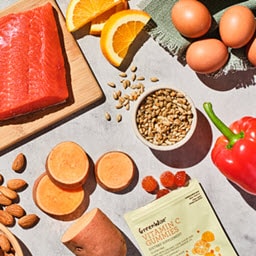
Published October 1, 2024
The skin is our largest organ, and just like any organ, our dietary and lifestyle choices can greatly impact its overall health. Nutritional deficiencies affect skin health and even cause damage.1
People have long sought the latest and greatest skin regimen to prevent aging, and smart nutrition is the skin’s best defense. Here are four vitamins to include in your diet that nourish your skin and may help fight the effects of aging.
Vitamin E
The fat-soluble vitamin E contains compounds that fight against oxidation, one of the primary processes that can cause your skin to age more quickly. Foods with vitamin E include vegetable oils, almonds, seeds, wheat germ, and some meats.2
Vitamin C
Like vitamin E, vitamin C prevents oxidation by fighting free radicals in the body. Vitamin C helps the body use vitamin E more efficiently. It also aids in the production of collagen and helps heal wounds.2 Foods with vitamin C include red bell peppers, oranges, and lemons.3
Vitamin A
A fat-soluble vitamin needed to grow healthy skin and hair, vitamin A and beta carotene can potentially protect your skin from damaging UVA and UVB rays.2 Foods with vitamin A include beef liver, cod liver oil, sweet potatoes, pumpkin, and carrots.2
Vitamin D
The body naturally produces vitamin D via sun exposure, primarily through the skin. Vitamin D helps protect skin cells from UVB damage.2 You can also obtain vitamin D from fatty fish, egg yolks, some mushrooms that are exposed to UV light, and fortified foods such as milk and cereals.2
Always use sunscreen to protect against damage from the sun’s UVA rays.
Bonus tip: Avoid inflammatory foods and nourish the immune system.
High fat, high sodium, high sugar, and restrictive diets can negatively impact your skin.1 These foods and diets lack key vitamins and minerals that support the body’s immune system and organs. A balanced, anti-inflammatory diet high in fruits and vegetables, whole grains, lean meats, and healthy fats is crucial for supporting skin health.4
Nourishing our skin has many benefits, and we can start now with the foods we eat; supplements can help as well. Be sure to talk with your doctor or dietitian first before embarking on any diet or supplement regimen. If you have any questions, please feel free to email our team of dietitians.
For more on how to support skin health through nutrition, check out Four Tips for Feeding Your Skin.
For the love of you.
Choosing how you eat is uniquely personal. It’s about your needs, your preferences, and your goals. As your wellness ally, we’re in your corner with fresh ideas, recipes, and wellness icons that make it easier to shift toward wiser food choices. It’s all about you, at your very best.
Sources
1Cao, Changwei, Zhichao Xiao, Yinglong Wu, and Changrong Ge. Diet and Skin Aging—From the Perspective of Food Nutrition. PubMed Central. March 24, 2020.
2Schagen, Silke K., Vasiliki A. Zampeli, Evgenia Makrantonaki, and Christos C. Zouboulis. Discovering the Link Between Nutrition and Skin Aging. PubMed Central. July 1, 2012.
3Vitamin C. National Institutes of Health. Last modified March 26, 2021.
4Gordon, Barbara. Can Diet Help with Inflammation? Academy of Nutrition and Dietetics. Last reviewed April 27, 2023.

 You are about to leave publix.com and enter the Instacart site that they operate and control. Publix’s delivery and curbside pickup item prices are higher than item prices in physical store locations. Prices are based on data collected in store and are subject to delays and errors. Fees, tips & taxes may apply. Subject to terms & availability. Publix Liquors orders cannot be combined with grocery delivery. Drink Responsibly. Be 21. For prescription delivery, log in to your pharmacy account by using the Publix Pharmacy app or visiting
You are about to leave publix.com and enter the Instacart site that they operate and control. Publix’s delivery and curbside pickup item prices are higher than item prices in physical store locations. Prices are based on data collected in store and are subject to delays and errors. Fees, tips & taxes may apply. Subject to terms & availability. Publix Liquors orders cannot be combined with grocery delivery. Drink Responsibly. Be 21. For prescription delivery, log in to your pharmacy account by using the Publix Pharmacy app or visiting